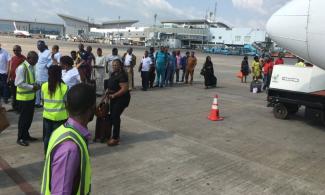
The Nigerian Civil Aviation Authority (NCAA) says no amount of blackmail from “some stakeholders’ in the country’s aviation industry would make it change its system of collecting 5 per cent Ticket Sales Charge (TSC) and Cargo Sales Charge (CSC) from airlines operating within and into the country.

The Nigerian Civil Aviation Authority (NCAA) says no amount of blackmail from “some stakeholders’ in the country’s aviation industry would make it change its system of collecting 5 per cent Ticket Sales Charge (TSC) and Cargo Sales Charge (CSC) from airlines operating within and into the country.
The regulatory agency also said that it sticks with the recently released statistics of N400.1bn as revenues generated from TSC and CPC in 2017.
NCAA accused some of the stakeholders of intentionally spreading falsehood in the system.
It would be recalled that Group Capt. John Ojikutu (rtd) had last week faulted the N400.1bn figures released by NCAA, accusing it of corruption and embezzlement.
But, in a statement by the General Manager, Public Affairs, Mr. Sam Adurogboye, NCAA insisted that the figures were verifiable.
Adurogboye explained that the prerequisite NCAA 5% TSC paid by passengers is indicated on the ticket, which is warehoused by NCAA and could be verified.
He added that the domestic billing process requires the airlines to submit to the agency their Passenger Departure Manifest (PDM) immediately after every flight departure, noting that it is from the filed fares that 5 per cent TSC is calculated.
He maintained that the automated integrated system ensures authenticity between NCAA server and airlines.
He added that the process of billing 5 per cent CSC requires the airlines to submit airway bill in accordance to the Nigerian Civil Aviation Regulations (Nig.CARs), stressing that the weight and rate stated on the airway bill is used in the calculation of the charge.
He emphasised that the statistics available for 5 per cent CSC are not the same as the harmonised figures, as cargo data capture the total weight of the cargo (import and export) while NCAA chargeable weight focuses on export cargo only.
"Furthermore, the authority authenticates the automated data output with the hard copy data submitted by the airlines. This serves as verification and determination of the actual flown passengers," he said.
“The following categories are non-revenue passengers and are therefore exempted from 5 per cent TSC calculation. These are diplomats, infants less than two years, those whose journeys do not originate from Nigeria (ticket sold offshore).
“In ticket sales, there are promotional, discounted, staff and low season’s fares. It is the aggregate of these that mischief makers sum up and begin to tout figures.”
He declared that airline fares are not constant and are dissimilar across routes and continental distances, and wondered why anyone would attach the same fare to all passengers.
He said it is impossible for any airline to remit 5 per cent TSC on passengers not flown, noting that airlines carry out a scrutiny of NCAA billing using their flown coupons before remitting sales charge to the agency.
“On international flights, the International Air Transport Association (IATA) provides support via Billing Settlement Plan (BSP) through its Clearing House, verification and direct collection of 5 per cent TSC. All the above processes attest to the sanctity of our figures," he added.
“NCAA will continue to ensure due diligence in data collation. This prevalent distraction will not deter the regulatory authority from providing a robust regulation that will engender safe and secure airline operations."